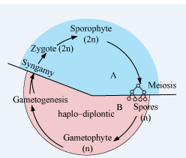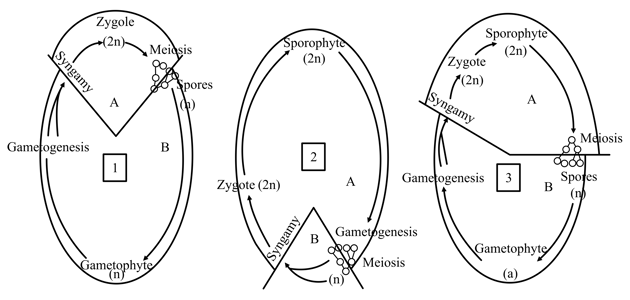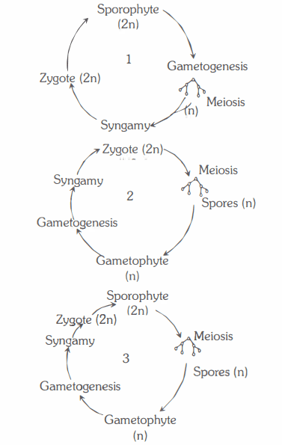Life Cycles in Plants
Life Cycles in Plants: Overview
This Topic covers sub-topics such as Diplontic Life Cycle, Haplontic Life Cycle, Haplo-diplontic Life Cycle and, Plants Life Cycle and Alternation of Generation
Important Questions on Life Cycles in Plants
Consider the following four statements. Which of the following statements are incorrect?
(A) The sporophyte in liverworts is more elaborate than in mosses.
(B) Salvinia is heterosporous.
(C) The life cycle of all seed-bearing plants are diplontic.
(D) In Pinus, male and female cones are borne on different trees.
A plant in which sporophytic generation is represented by zygote:
Which of the following does not show diplontic life cycle?
Identify the labels A, B, C and D in the figure given below

Oogamous type of sexual reproduction and diplontic life cycle is seen in
(a) Ectocarpus (b) Spirogyra
(c) Wolfia (d) Fucus
Which of the following correctly represents the type of lifecycle patterns from the given options?

Which of the following correctly represents the type of life cycle patterns from the options given?

Life cycle of Ectocarpus and Fucus respectively are
Which one of the following has haplontic life cycle?
Life cycle of Ectocarpus and Fucus respectively are:
Among the following plant group which has independent gametophyte and sporophyte?
______ is the initial stage of the sporophyte.
A multicellular, filamentous alga exhibits a type of sexual life cycle in which the meiotic division occurs after the formation of zygote. The adult filament of this alga has
Comparable to angiosperms, which of the following algae exhibits diplontic life cycle?
In most of the plants meiosis results in formation of:
Identify diagrams & select the correct option with their suitable examples.
